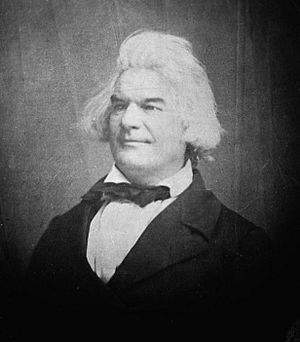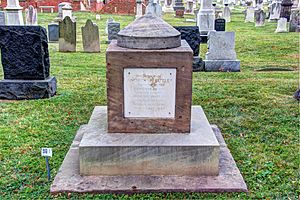Andrew Butler facts for kids
Quick facts for kids
Andrew Butler
|
|
|---|---|
 |
|
| United States Senator from South Carolina |
|
| In office December 4, 1846 – May 25, 1857 |
|
| Preceded by | George McDuffie |
| Succeeded by | James H. Hammond |
| Judge of the South Carolina Court of Common Pleas | |
| In office December 6, 1833 – December 3, 1846 |
|
| Member of the South Carolina Senate from Edgefield District | |
| In office November 22, 1824 – December 5, 1833 |
|
| Personal details | |
| Born |
Andrew Pickens Butler
November 18, 1796 Edgefield, South Carolina, U.S. |
| Died | May 25, 1857 (aged 60) Edgefield, South Carolina, U.S. |
| Political party | Democratic |
| Spouses | Susan Ann Simkins Rebecca Harriett Hayne |
| Profession | Politician, lawyer, judge |
| Signature | |
Andrew Pickens Butler (November 18, 1796 – May 25, 1857) was a United States senator from South Carolina who authored the Kansas-Nebraska Act with Senator Stephen Douglas of Illinois.
Biography
Butler was a son of William Butler and Behethland Butler (1764–1853), and was born in Edgefield, South Carolina. His early education was at Moses Waddel's Willington Academy. He graduated from South Carolina College, now the University of South Carolina. He was admitted to the South Carolina bar in 1818.
Political history
Butler was elected to the South Carolina House of Representatives as a young man, and in 1824 was elected to the South Carolina Senate. He served two terms and part of a third in the state Senate before being appointed the judge of the session court in 1833. In 1835, Butler was appointed the judge of the South Carolina Court of Common Pleas.
U.S. Senate
Butler was appointed to the United States Senate in 1846 as a States' Rights Democrat and elected thereafter to finish the term ending in 1849. He was re-elected by the South Carolina legislature to a full term in 1848 and again re-elected in 1854. He served in the Senate for the remainder of his life and was the chairman of the Senate Judiciary Committee during much of that time.
Butler was an ardent advocate of slavery. He was a co-author with Stephen A. Douglas of the Kansas-Nebraska Act of 1854. This act provided for westward expansion, but in order to gain Southern support, it repealed the Compromise of 1820 by allowing voting residents of new states the right to choose on allowing slavery.
Death
Butler's death at age 60 was attributed to dropsy, an archaic term for edema. He was buried in the Butler Family Cemetery near Saluda.
Evaluation
U. R. Brooks noted that biographical material to write from was scanty and that Butler's power lay in his own presence with "grand gifts of eloquence, action, pathos, and convincing argument." Ellet wrote
Senator Andrew Pickens Butler was conceded to be the most unique and original intellect in the Senate. His face, though not handsome, was sturdily expressive, with massive features and "troubled, streaming, silvery hair, that looked as though it had been contending with the blasts of winter".... His power as a speaker stood acknowledged in the admiration of both Houses... Like all men of impetuous impulse, he was very restless; one moment pacing to and fro the space behind the Speaker's desk, another giving the grasp of his hand to some younger Senator, the next taking active part in the debates of the day.... The moment a question was submitted to him, his mind instinctively applied all the great principles.
Legacy
Butler County, Kansas is named for him. His brother William Butler and his nephew Matthew Calbraith Butler also served in the United States Congress.



